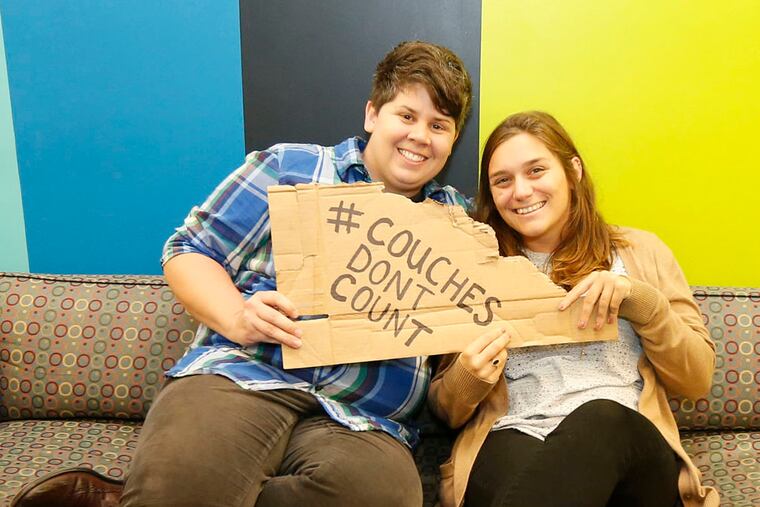That couch in Rittenhouse Square? It's got a story
It's sure to look out of place - an old, gray-and-blue couch set on the edge of fashionable Rittenhouse Square.

It's sure to look out of place - an old, gray-and-blue couch set on the edge of fashionable Rittenhouse Square.
But feel free to take a seat.
The people putting it there want passersby to settle into the cushions for a few minutes of conversation on a disquieting topic - young people who are pushed into homelessness largely because of their sexuality.
Youths generally don't go to shelters. Instead, they can end up moving couch to couch at the homes of friends, acquaintances, or strangers - vagabond guests hidden from those who could help, and potentially exposed to exploitation from people who invite them inside for all the wrong reasons.
On Wednesday, Valley Youth House kicks off a novel "Couches Don't Count" campaign, seeking to raise awareness and money by lugging a piece of living-room furniture to prominent Center City settings and inviting pedestrians to sit and talk.
"It's not 'in your face,' " said Valerie Johnson, the agency development officer. "There are a lot of LGBT homeless youth, and we want to help as many of them as we can."
In Philadelphia about 40 percent of homeless youths are lesbian, gay, bisexual, or transsexual, studies say. National statistics mirror that - and show more than 40 percent ran away or were forced out of their homes because their families could not accept their sexual orientation or identity.
They represent a percentage of a percent - not just young, homeless, or gay, but all three. That helps make them invisible.
On Wednesday, Youth House leaders will meet at their Center City office to announce the initiative and a companion fund-raiser called "Sheltering Pride." They plan to spread the news on social media with the hashtag #CouchesDontCount.
The couch begins its journey at 18th and Walnut, outside the Barnes & Noble bookstore, at noon Wednesday. On Thursday, it moves to Market Street, in front of the National Constitution Center. Later that day it goes to Woody's Bar near 13th and Walnut, and on Sunday to OutFest at 12th and Locust.
In the last five years, through its Pride program, the agency has managed to move 111 gay or transgender youths into apartments. That's a small number, less than one a week, agency leaders said.
But each digit represents a life newly stabilized, a youth age 18 to 21 who because of relatively inexpensive help can become a working taxpayer.
Now agency leaders hope extra funding can help them serve greater numbers.
The Youth House provides the first and last months' rent, the security deposit, and up to four months of additional payments. It can offer used furniture, too.
Moreover, its counselors work with young people all through the process, helping them locate an apartment, develop a household budget, and - crucially - find a job. The agency ensures its clients have a bank account, phone, and identification.
Young people often don't see themselves as homeless though they lack a home. They may describe their situation as house-hopping or couch-surfing, even as it drains their finances and endangers their health.
Kierra Harvey, 20, lived with her mother in West Philadelphia as part of a big, loving Christian family. In January, Harvey said, her mom discovered she was gay - first threatening to hit her, then forcing her to leave.
"All I had was my mom," Harvey said. "She kicked me out."
Harvey was afraid to go to a shelter, so she slept wherever she could beg a bed or a couch. For a while, she lived in an empty apartment with no electricity.
In June, she connected with Valley Youth House, which enabled her to move into the Olney apartment she now shares with her fiancee. Harvey has been able to save money and eat better by cooking at home, and to more easily commute to her job at Woods Services in Langhorne.
Nationally, between 30 percent and 43 percent of homeless youths are gay, according to the Williams Institute, a UCLA center that studies sexuality and public policy.
Two-thirds experienced family rejection - coming out as gay was a flash point - and more than half endured sexual, physical, or emotional abuse in their family, studies show.
Some become homeless when they age out of the foster-care system. Some live in hotels until their money is gone. Some end up living with predators, engaging in "survival sex" just to stay out of the cold.
"Homelessness is traumatic," said Sarah Morrison, a life-skills counselor at Valley Youth House.
And it's dangerous. Homeless gay youths face heightened risks of violence and abuse.
Safiya Washington, 22, never considered herself homeless. Because somehow she always found a place to sleep indoors, even if she wasn't fully welcome or comfortable.
For a time, she said, she stayed with a volatile ex-girlfriend, then with a sister who demanded ever-rising rent payments.
In January, she said, the Youth House helped her get an apartment in North Philadelphia. She commutes to her job at Ikea in South Philadelphia.
"Home is somewhere you feel safe," Washington said. "I didn't feel like that for a very long time."
215-854-4906@JeffGammage